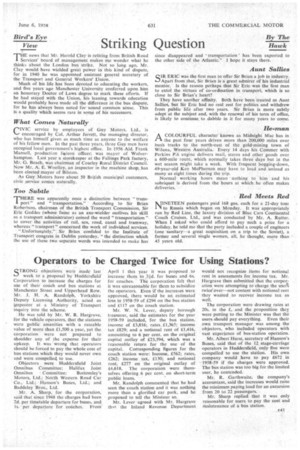Operators to be Charged Twice for Using Stations? • 5 TRONG objections
Page 85

If you've noticed an error in this article please click here to report it so we can fix it.
were made last week to a proposal by Huddersfield Corporation to increase the charges for use of their coch and bus stations at Manchester Street and Upperhead Row. Mr. J. H. A. Randolph, Yorkshire Deputy Licensing Authority, acted as inspeotor at a Ministry of Transport inquiry into the scheme. He was told by Mr. W. R. Hargrave, for the vehicle operators, that the stations were public amenities with a rateable value of more than 11,500 a year, yet the corporation were not prepared to shoulder any of the expense for their upkeep. It was wrong that operators should be forced to pay the whole cost of bus stations which they would never own and were compelled to use. Objectors were Huddersfield Joint Omnibus Committee; Halifax Joint Omnibus Committee; Bottomley's Motors, Ltd.; North Western Road Car Co., Ltd.; Hanson's Buses, Ltd.; and Baddeley Bros:, Ltd.
Mr. A. Sharp, for •the corporation, said that since 1948 the charges had been 2d. per timetable departure for buses, and 1s. per departure for coaches. From April 1 this year it was proposed to increase them to .31d. for buses and bs. for coaches. The corporation felt that it was unreasonable for them to subsidize the operators. Even if the increases were. approved, there would be an estimated loss in 1958-59 of £294 on the bus station and 1.117 on the coach station.
Mr. W. N. Lever, deputy borough treasurer, said the estimates for the year 1958-59 included, for the bus station, income of £3,816; rates. £1,365; income tax £829; and a notional rent of £1,416, amounting to 6 per cent, on the original capital outlay of £23,594, which was a reasonable return for the use of the capital. Corresponding figures for the coach station were Income, £562; rates, £262; income tax, £130; and notional rent, £27.7 on the original outlay of £4,618. The corporation were themselves offering 6 per cent, on short-term public loans, Mr. Randolph commented that he had seen the coach station and it was nothing more than a glorified car park, and he proposed to tell the Minister so.
Mr. Lever agreed with Mr. Hargrave that the Inland Revenue Department would not recognize items for notional rent in assessments for income tax. Mr. Hargrave then submitted that the corporation were attempting to charge the users twice' over—notcontent with notional rent they wanted to recover income tax as well.
The corporation were drawing rates at 20s, in the £, and the proposition they were putting to the Minister was that the users should pay everything. Even their own transport manager was among the objectors, who included operators with vast experience of bus-station operation.
Mr. Albert Hurst, secretary of Hanson's Buses, said that of the 12 stage-carriage operators in Huddersfield, only five were compelled to use the station. His own company would have to pay £672 in 1958-59 if the charges were approved. The bus station was too big for the limited user, he contended. Mr. R. Garthwaite, the company's accountant, said the increases would raise the minimum paying load for an excursion from 20 to 22 passengers. Mr. Sharp replied that it was only reasonable for users to pay the cost and maintenance of a bus station.








































































































































